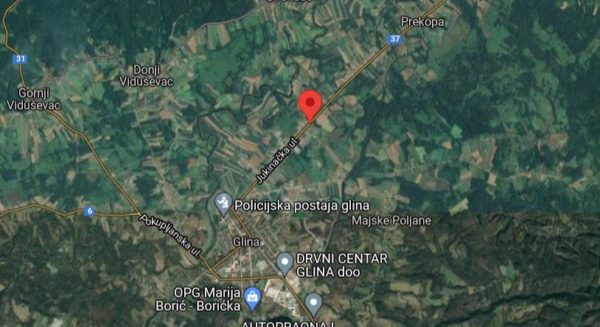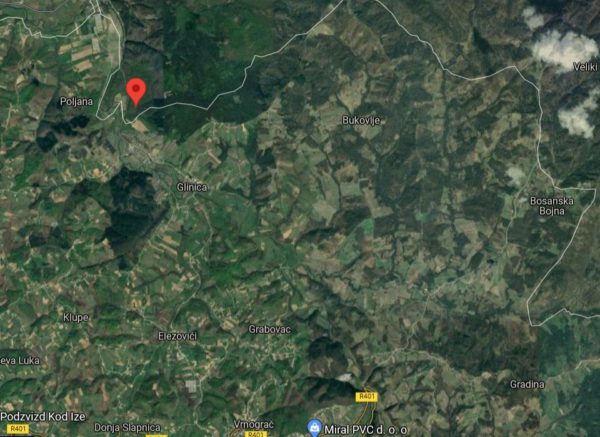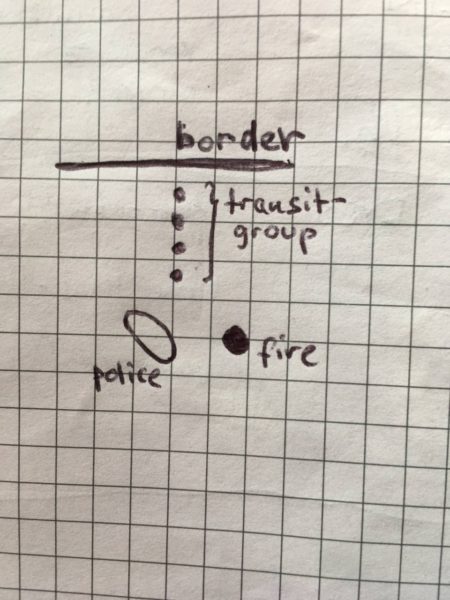The respondent is a 21-year-old man from Pakistan and was part of a transit group consisting of three other men from Pakistan, ages 20, 25 and 32). They left Velika Kladuša on Tuesday 25th January at 5 PM by bus to Vrnograč, a town near the Bosnian-Croatian border. From Vrnograč, they walked through forest areas until they crossed the border on foot at approximately 11 pm. The respondent stated that they then continued to walk throughout the night, reaching the small Croatian town of Glina at around 4 AM. They boarded a bus at 5.30 AM that was supposed to go to Zagreb.
The respondent suspected that a local on the bus informed the police that there were people on the move on the bus. The respondent recalled that after about 20 minutes of driving on the bus at approximately 6 AM, shortly after Glina, the bus was stopped by one man and one woman wearing dark blue uniforms, arriving in a big car (45.353613, 16.102734). The description corresponds to that of the Croatian border police.

The respondent stated that all passengers were asked to leave the bus and show their documents. As the respondent could not show any identification document, he and all members of the transit group were patted down and all items they were carrying on their bodies (four mobile phones and two power banks) were taken from them. Afterwards, the four were asked to get into a vehicle. The respondent described the vehicle as “big van, big, white, with silver in front and blue on side” and was able to recognise it from a photo shown at the interview. The vehicle recognised is a prisoner transport van, usually used by the Croatian border police. The respondent stated that he had no air supply during the estimated 45-minute drive and described feeling quite nauseous in the vehicle: “but too much [doing a circle-gesture with his hand] in this ride, after vomit in van”. In addition, the air conditioning was on despite it being cold outside, exposing the transit group to extremely cold temperatures.
The respondent stated that there were a total of nine people in uniforms and two cars at the scene of the pushback (45.212281, 15.9291107).

Of these, two men were wearing all-black uniforms and ski masks. This description resembles that of the uniforms worn by the Croatian intervention police. He reported that after leaving the vehicle, the group was asked to take off their jackets, jumpers, backpacks with sleeping bags and shoes. They were then asked to sit in a row on the ground. The respondent stated that the two men wearing the black face masks threw all the belongings of the transit group into a hole in the ground. Phones and power banks that the four had already handed in were also thrown into this hole. Afterwards one of the intervention police officers set fire to the items. All members of this transit group were forced to watch all their personal belongings burn, which lasted what the respondent felt was one hour. During the interview, the respondent drew the following photo to describe the pushback situation. He estimated it to be 9 AM in the morning.

When the fire had quenched, the respondent and his friends were ordered to stand and quickly return to Bosnia: “No come back, just run fast, run fast to Bosnia!”. The respondent described that at the pushback location, in the direction of Bosnia, there was a two-foot wall. The transit group had to jump over this wall and then, pressured by the yells of the police officers, continue to run. The ground was icy and the men were wearing socks since their shoes were burned before: “Deport on socks“.
The respondent stated that he had injured his knee when jumping over this wall. After crossing the border back to Bosnia and Herzegovina they reached first again Vrnograč, where some Bosnian locals helped them, giving them some blankets and clothes. Then they continued walking for what felt to the respondent like five hours. They reached the Miral camp of Velika Kladuša around 4 PM.
Although the personal belongings of the respondent were stolen and destroyed during this pushback, he stated: “Sometimes police beat, but sometimes police no beat. Last time no beat“.
